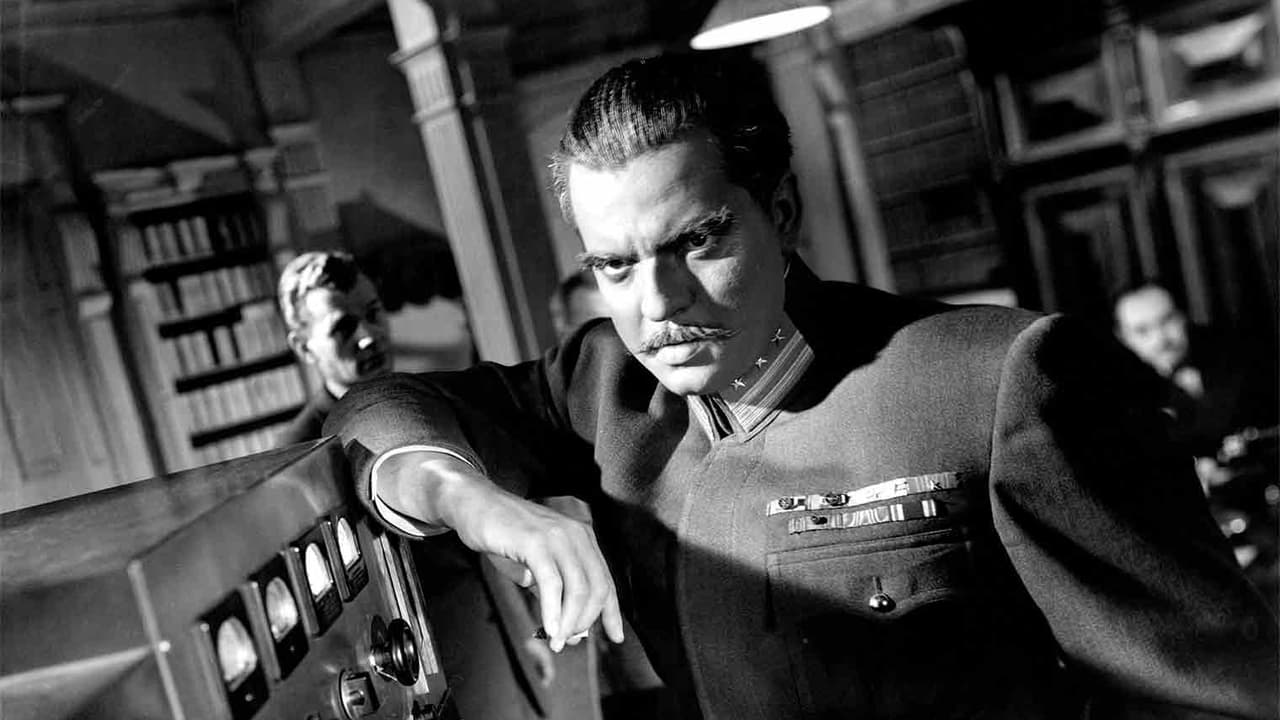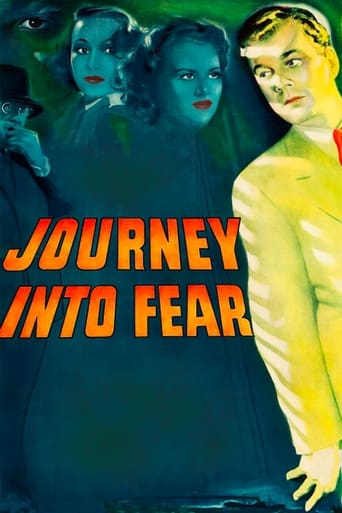

Stylish but barely mediocre overall
... View MoreIt was OK. I don't see why everyone loves it so much. It wasn't very smart or deep or well-directed.
... View MoreIt's easily one of the freshest, sharpest and most enjoyable films of this year.
... View MoreThis movie tries so hard to be funny, yet it falls flat every time. Just another example of recycled ideas repackaged with women in an attempt to appeal to a certain audience.
... View More. . . "Ian F." was interviewed "off-the-record" by that ubiquitous Hollywood gadfly of the late 1900s, "Peter Fogbottom," about his second most famous creation--"James Bond"--Mr. F. confessed that "Secret Agent 007" was based upon JOURNEY INTO FEAR's U.S. traveling salesman character "Howard Graham" more than anything else. As Ian told Pete, "Howie isn't afraid to take on a quartet of heavily-armed Nazi thugs when he himself is equipped merely with an umbrella," referring to the JOURNEY INTO FEAR bit just BEFORE Mr. Graham drives the Gestapo staff car through a store front. "Seeing Howie charging the Third Reich assassin on a high-rise window ledge through a drenching rain bearing nothing more than a pocket comb got me to thinking," continued novelist Ian. "If an American could be so brave and foolhardy, surely an Englishman enjoying a large support bureaucracy backing him up with high tech gadgets might be able to pull off some of Graham's daring do stunts, if they were sufficiently down-sized." Of course, as they say, "the rest is hearsay."
... View MoreNaval ordinance engineer Howard Graham (Joseph Cotten) is in Istanbul overnight with his wife Stephanie as he tries to deal with the wartime arms trade. They're pestered by Kopeikin who claims to be from his company. He starts showing Howard around the night life when a performer is killed. Howard suspects the bullet was meant for him. They are brought before Turkish intelligence Colonel Haki (Orson Welles) who shows him a suspected Nazi agent. Howard is rushed onto a ship without his wife to escape the assassin. It's a ship full of unusual characters and the suspected Nazi agent has followed him.Orson Welles was involved in the writing, directing, and producing of this film. Difficulties with the schedule meant that Norman Foster had to take over most of the directing. Nevertheless, there are many Welles touches on the screen and it's hard to tell what is his contribution.. It's a bit of a forgotten Welles film. Besides Cotten, there are a few of the Welles crew. The mystery thriller has real tension. The rain-soaked ledge is well made. It's all well done.
... View MoreI do not recommend seeing this on your first round through cinema or Welles, or if you're inexperienced with narrative. It will seem ordinary with some flourishes, and easy to dismiss as a botched studio job. If on the other hand, you've come to be a lucid viewer that collaborates with the film to create your own space, then I urge you to watch this as the Japanese do their gardening.Now we cannot go past Welles when talking about this. Bodganovich believes he had something to do with directing, certainly the few obvious scenes where the camera dances. Welles himself discards any such thing but does not deny collaborating - and can you imagine a film where the genius behind Kane is involved and does not bend the vision to his?In one or the other capacity, this is an Orson Welles film, there's no way past it.But Welles also claims that, if it hadn't been for RKO's meddling, the film was going to be a straight-up entertaining thriller, classy, emphasis on characters and story. That is fine, the way Hitchcock did things, but it's not what we have. RKO rolled in and deliberately botched it, the sooner to be rid of its wunderkind. So popular opinion has naturally filed this under muddled story with some interest where Welles is supposed to have directed, and largely forgotten all about it.No, something else goes on here, what I call the Ambersons effect. Ambersons was the other film that RKO destroyed while Welles was away in Brazil (the two films were simultaneously filmed), and is a much more clear example of what I'm talking about. It was going to be something on the scope and innovation of Kane, was botched, almost one third of it, and we're left with an unfinished, peculiar masterpiece that in turns is and hints at the film it was meant to be.My notion is that both this and Ambersons indirectly benefited from this meddling, the result being a radically new type of narrative. The Ambersons effect is a story that collapses in on itself as focus shifts 'on' the story, which comes from studio editors cutting a complex story for continuity. It is one of those genius accidents that no one could think of until it simply happened by itself. I elaborate on this in my post for Ambersons.So look at this. Superficially, it's a noir thriller about an American arms adviser in Turkey who is forced to go on the run to avoid being murdered by Nazis. He's forced to go undercover in short notice, boarding a freighter with a sexy cabaret dancer. But he has left a wife behind in their hotel room.So how to exemplify intense anxiety that comes from dislocation in the world of the narrative? Here come two amazing narrative devices written in by Welles.The first is that he's writing a letter to his wife that explains his prolonged absence, we never see him actually write but bits of this are narrated to us all through the film. The feeling of guilt and adoration that pours from it so peculiar, it makes one wonder if he hasn't really eloped with the dancer - or desires to - and our film is really his far-fetched fabrication where nothing happens of his own free will and he's practically buffeted around by forces beyond control. The other is where the entire plot is set in motion on a stage with murder as part of a magician's disappearing act, except the magician is killed in our man's place. What better way to stress fabrication?So a world that magically shifts so that fates are in control and calling the shots, fabricated as a narrative that excuses loss of control that is desire for the woman in the cabaret, the deceit mirrored in the host of strange characters onboard the ship acting roles.One is a henpecked husband who discovered he can spout off communist talk to embarrass his wife into submission, another clue here; over time, he became the invented role and now believes in the act. He's now a fervent communist. Another is the Turkish hit-man registered on the passenger roll as a Greek businessman. This has a rich political subtext on the region the ship sails through, the Pontic coast, where hundreds of thousands of Pontic Greeks were massacred by the Kemalists, the regime served by Welles' character in the film.There is poker involved as means of wrestling away control of the story, and another agent counter-plotting. Of course moral anxiety our man is feeling becomes so devastating, the voyage becomes this strange ritual journey where characters prepare him for death. Notice the talk on the deck - also deceiving - about change and time stopped. Notice the sailor who pretends to shoot him and cackles hysterically.So how does he come back into the light? Of course he tears away the story as soon as he's finished actually writing it. The wife will never know, or the thing never happened, normal life can be resumed. This is great stuff.
... View MoreWell it says Journey Into Fear was directed by Norman Foster, but many sources say it was actually Orson Welles who directed it. Possible of course since this Mercury Theatre production was produced, co- written {with co-star Joseph Cotton} and starred big Orson himself. But wait! Welles is on record as saying he did no directing on the film and it was his friend Foster in the chair. Except for Welles' own scenes which were directed by anyone handy since they were rushing because Welles was due in Brazil to film It's All True! There has also been re-cuts by Welles, added scenes and a narration at the beginning and end that has been and gone over the years. It's all appropriate confusing conjecture tho since the film itself has a strange quirkiness nestling within its arresting visuals.The story is based on Eric Ambler's highly regarded spy thriller, and sees Howard Graham {Joseph Cotton} as an American engineer, who after a conference in Turkey finds that someone is trying to kill him. We are then thrust into a murky world of espionage where everybody, their motives, and their identities are suspect. Graham is the classic innocent man abroad, we the viewers, as well as everyone in the story but Graham, knows more than he does! I bet Hitchcock loved this film for it be right up his alley. The majority of the film takes place aboard a cramped dilapidated liner, this gives off a wonderfully claustrophobic feel to proceedings. The stifling nature further enhanced by the fact that 99% of the film is set at night time, with Karl Struss' photography utilising shadows and exuding an almost bizarre menacing sheen. There's some nice technical Welles trademarks in here, such as crane shots {the opening scene is moodily awesome} and Welles' well publicised love of magic is given a cute nod during one particularly impacting sequence.Along side Cotton the cast contains solid performers like Dolores del Rio, Everett Sloane, Ruth Warwick and Agnes Moorehead. But it's Cotton who rightly makes the big impact. Understated and quiet, his Howard Graham infuriates with his inability to grasp what is going on, or to act at times when it clearly calls for the swift clank of brain being put into gear. A real smart bit of casting here from Foster, Welles or whoever! Journey Into Fear, for texture and technical composition belongs in the film-noir genre, certainly as far as the early cycle goes. But really it's a film for the general cinema purists, at times brilliant, at others chaotic, it remains engrossing from start to finish. See it if you can. 8/10
... View More